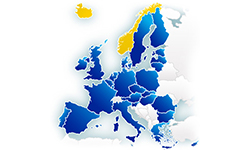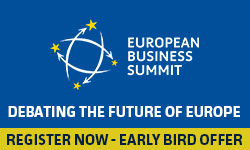BusinessEurope Headlines No. 2016-18
Markus J. Beyrer speaks about growth and industry at 46th St. Gallen Symposium
 "I cannot question the need for growth. Growth is not an end in itself but a way of creating employment, incentivising investment, supporting redistribution, and increasing living standards. What we can question is the kind of growth we need and what mechanisms must be in place to have an inclusive growth", Markus J. Beyrer said on a discussion panel on the need for growth. "In Europe we need to act on growth, both at the national level by implementing reforms that improve the resilience and competitiveness of economies, and at the EU level where we need smart regulation which does not harm companies – the main source of job creation", he added.
"I cannot question the need for growth. Growth is not an end in itself but a way of creating employment, incentivising investment, supporting redistribution, and increasing living standards. What we can question is the kind of growth we need and what mechanisms must be in place to have an inclusive growth", Markus J. Beyrer said on a discussion panel on the need for growth. "In Europe we need to act on growth, both at the national level by implementing reforms that improve the resilience and competitiveness of economies, and at the EU level where we need smart regulation which does not harm companies – the main source of job creation", he added.
Watch the debate or contact: Joana Valente
Canada: CETA key for EU trade policy
 "The Comprehensive Economic and Trade Agreement (CETA) comes at a critical moment: it is decisive for the future of the EU trade policy", BusinessEurope International Relations Director Luisa Santos said at the conference 'CETA: a good deal for the European Union?' jointly organised on 18 May by the Centre for European Policy Studies and the Centre for International Governance Innovation. CETA is a very positive agreement from the point of view of European business. It ensures a very good outcome in terms of market access for public procurement, services and tariffs, as well as intellectual property rights and regulatory cooperation, just to name a few areas. It sets a very good precedent for other negotiations in a number of fields. CETA has even more importance now than when negotiations started years ago, because now the EU debate around trade has taken a new dimension that it didn’t have at the time. Implementing CETA is important not only for the EU-Canada commercial relationship, but for trade policy altogether. If CETA fails, the signal sent to European companies and other trading partners would be that the EU is no longer able to deliver on one of its key policy areas, one that is critical to boost economic growth.
"The Comprehensive Economic and Trade Agreement (CETA) comes at a critical moment: it is decisive for the future of the EU trade policy", BusinessEurope International Relations Director Luisa Santos said at the conference 'CETA: a good deal for the European Union?' jointly organised on 18 May by the Centre for European Policy Studies and the Centre for International Governance Innovation. CETA is a very positive agreement from the point of view of European business. It ensures a very good outcome in terms of market access for public procurement, services and tariffs, as well as intellectual property rights and regulatory cooperation, just to name a few areas. It sets a very good precedent for other negotiations in a number of fields. CETA has even more importance now than when negotiations started years ago, because now the EU debate around trade has taken a new dimension that it didn’t have at the time. Implementing CETA is important not only for the EU-Canada commercial relationship, but for trade policy altogether. If CETA fails, the signal sent to European companies and other trading partners would be that the EU is no longer able to deliver on one of its key policy areas, one that is critical to boost economic growth.
Contact: Eleonora Catella
Markus J. Beyrer meets Lowri Evans of DG GROW
 The single market is at the core of European competitiveness and its good functioning is linked to the success of policies for SMEs, industry and international trade. On 17 May a delegation of BusinessEurope led by Director General Markus J. Beyrer discussed these issues with Lowri Evans, European Commission Director General of DG Internal Market, Industry, Entrepreneurship and SMEs. Implementation of the single market strategy is at a crucial stage and should take companies’ needs into account, particularly SMEs, especially to support their growth and cross-border activities. Digitalisation, services and standards are all crucial elements of an approach that can strengthen Europe’s industrial basis. The issue of China and the treatment of China in anti-dumping procedures was also discussed at the meeting.
The single market is at the core of European competitiveness and its good functioning is linked to the success of policies for SMEs, industry and international trade. On 17 May a delegation of BusinessEurope led by Director General Markus J. Beyrer discussed these issues with Lowri Evans, European Commission Director General of DG Internal Market, Industry, Entrepreneurship and SMEs. Implementation of the single market strategy is at a crucial stage and should take companies’ needs into account, particularly SMEs, especially to support their growth and cross-border activities. Digitalisation, services and standards are all crucial elements of an approach that can strengthen Europe’s industrial basis. The issue of China and the treatment of China in anti-dumping procedures was also discussed at the meeting.
Contact: Guido Lobrano
ETS reform: ITRE draft opinion needs to be improved
 The European Parliament's Industry, Research, and Energy Committee (ITRE) rapporteur’s draft opinion does not take properly into account the double objective of stimulating investment in the energy sector while supporting the global competitiveness of industry, BusinessEurope said in a statement reacting to the report of MEP Federley on the post-2020 reform of the EU emission trading scheme (ETS). A structural solution to ensure sufficient free allowances for best performers is to modify the ratio of 57% auctioning vs. 43% free allowances. This would help avoid many difficulties without disturbing the carbon market or questioning the environmental integrity of the system.
The European Parliament's Industry, Research, and Energy Committee (ITRE) rapporteur’s draft opinion does not take properly into account the double objective of stimulating investment in the energy sector while supporting the global competitiveness of industry, BusinessEurope said in a statement reacting to the report of MEP Federley on the post-2020 reform of the EU emission trading scheme (ETS). A structural solution to ensure sufficient free allowances for best performers is to modify the ratio of 57% auctioning vs. 43% free allowances. This would help avoid many difficulties without disturbing the carbon market or questioning the environmental integrity of the system.
Read more or contact: Alexandre Affre
Making the case for national competitiveness boards
 A system of national competitiveness boards as proposed by the European Commission as part of the process of deepening the Economic and Monetary Union (EMU) has the potential to encourage greater awareness of both the need for reforms and their potential impacts on competitiveness. This was the message from BusinessEurope’s Economics Director, James Watson at a hearing on the proposed boards at the European Economic and Social Committee on 12 May. But, he went on to add, the boards need to look at broad aspects of competitiveness, including innovation and skills, not just wage developments, an area in which they must respect the autonomy of social partners. And whilst agreement on competitiveness boards would be an important step forward, it is essential that the EU Council speeds up negotiations on more substantive aspects of deepening the EMU proposed last year in the so-called ‘5 Presidents Report’.
A system of national competitiveness boards as proposed by the European Commission as part of the process of deepening the Economic and Monetary Union (EMU) has the potential to encourage greater awareness of both the need for reforms and their potential impacts on competitiveness. This was the message from BusinessEurope’s Economics Director, James Watson at a hearing on the proposed boards at the European Economic and Social Committee on 12 May. But, he went on to add, the boards need to look at broad aspects of competitiveness, including innovation and skills, not just wage developments, an area in which they must respect the autonomy of social partners. And whilst agreement on competitiveness boards would be an important step forward, it is essential that the EU Council speeds up negotiations on more substantive aspects of deepening the EMU proposed last year in the so-called ‘5 Presidents Report’.
Read more or contact: James Watson
Energy efficiency in the DNA of European industry
 Being energy efficient is one of the key values for European companies, and industry has proved to be at the forefront of these efforts. European industry has improved its energy intensity twice as much compared to its counterparts in the United States. Without any compromise, Europe should keep its commitment to enhance energy efficiency, especially in sectors with the highest potential, requiring a well-designed and coherent policy framework. These and other key messages are conveyed by BusinessEurope in its views on the review of the energy efficiency directive. To provide for long-term certainty and investment, it is crucial that the overall ambition in the revised legislation remains consistent with the political agreement by the European Council in 2014, and should focus on efficiency – using energy in a cost-efficient way – rather than merely on savings.
Being energy efficient is one of the key values for European companies, and industry has proved to be at the forefront of these efforts. European industry has improved its energy intensity twice as much compared to its counterparts in the United States. Without any compromise, Europe should keep its commitment to enhance energy efficiency, especially in sectors with the highest potential, requiring a well-designed and coherent policy framework. These and other key messages are conveyed by BusinessEurope in its views on the review of the energy efficiency directive. To provide for long-term certainty and investment, it is crucial that the overall ambition in the revised legislation remains consistent with the political agreement by the European Council in 2014, and should focus on efficiency – using energy in a cost-efficient way – rather than merely on savings.
Read more or contact: Jan Bambas
Company transparency: recognising the value as well as the limitations
 Transparency is important for companies and indeed all organisations, however it is for companies to decide on the action they take to be transparent and the issues they communicate on, in cooperation with their stakeholders. This was the main message of Rebekah Smith, BusinessEurope Senior Adviser for Social Affairs, at the hearing of the European Economic and Social Committee on 13 May on a draft opinion on the limitations of company transparency. Supporting the approach of the rapporteur, Vladimira Drbalová, from the Czech Confederation of Industry, BusinessEurope emphasised the importance of providing flexibility to companies to tailor transparency and CSR (corporate social responsibility) actions to their specific situation. Following on from this, she called for the European Commission, in its non-binding guidelines on disclosure of non-financial information, to stick to general principles and avoid creating a new, overly prescriptive reporting framework.
Transparency is important for companies and indeed all organisations, however it is for companies to decide on the action they take to be transparent and the issues they communicate on, in cooperation with their stakeholders. This was the main message of Rebekah Smith, BusinessEurope Senior Adviser for Social Affairs, at the hearing of the European Economic and Social Committee on 13 May on a draft opinion on the limitations of company transparency. Supporting the approach of the rapporteur, Vladimira Drbalová, from the Czech Confederation of Industry, BusinessEurope emphasised the importance of providing flexibility to companies to tailor transparency and CSR (corporate social responsibility) actions to their specific situation. Following on from this, she called for the European Commission, in its non-binding guidelines on disclosure of non-financial information, to stick to general principles and avoid creating a new, overly prescriptive reporting framework.
Contact: Rebekah Smith
Revision of the posting directive will be harmful for the single market
 BusinessEurope is against the European Commission’s decision to revise the posting of workers directive. Posting of workers is already well regulated. Existing rules provide a level playing field for business. They also adequately protect posted workers, in particular as they require the respect of host-country minimum rates of pay. New rules on remuneration, longer postings and subcontracting contained in the Commission’s proposal would do nothing to address abuses, and only hamper cross-border trade in services as well as convergence in the EU. To promote fair competition, the policy focus should be on fighting illegal practices, including through implementation of the 2014 enforcement directive. The Commission should avoid triggering a prolonged period of debate and political divisions between member states at times when the EU needs actions promoting unity.
BusinessEurope is against the European Commission’s decision to revise the posting of workers directive. Posting of workers is already well regulated. Existing rules provide a level playing field for business. They also adequately protect posted workers, in particular as they require the respect of host-country minimum rates of pay. New rules on remuneration, longer postings and subcontracting contained in the Commission’s proposal would do nothing to address abuses, and only hamper cross-border trade in services as well as convergence in the EU. To promote fair competition, the policy focus should be on fighting illegal practices, including through implementation of the 2014 enforcement directive. The Commission should avoid triggering a prolonged period of debate and political divisions between member states at times when the EU needs actions promoting unity.
Read more or contact: Magdalena Bober
European works councils: Learning from managers to improve their functioning
 Managers engage workers constructively to derive an added value from European works councils (EWCs). While there are various operational difficulties in running EWCs - e.g. timelines, definition of a transnational issue, confidentiality - most companies are able to find practical solutions to such challenges. It is also clear that improvements in information and consultation practices in EWCs do not stem from legislation. The added value of EWCs and the quality of information and consultation depend largely on mutual trust, engagement and a common culture within a company. Also interestingly, a majority of respondents report no problem with the current EU legal framework - the recast directive adopted in 2009. These were the main messages BusinessEurope made during a conference organised on 13 May in Leuven. The aim was to discuss the report "The Perspective of Management on European Works Councils" prepared by the University of Leuven based on 56 interviews with managers across the EU, in the framework of a project financed by the European Commission.
Managers engage workers constructively to derive an added value from European works councils (EWCs). While there are various operational difficulties in running EWCs - e.g. timelines, definition of a transnational issue, confidentiality - most companies are able to find practical solutions to such challenges. It is also clear that improvements in information and consultation practices in EWCs do not stem from legislation. The added value of EWCs and the quality of information and consultation depend largely on mutual trust, engagement and a common culture within a company. Also interestingly, a majority of respondents report no problem with the current EU legal framework - the recast directive adopted in 2009. These were the main messages BusinessEurope made during a conference organised on 13 May in Leuven. The aim was to discuss the report "The Perspective of Management on European Works Councils" prepared by the University of Leuven based on 56 interviews with managers across the EU, in the framework of a project financed by the European Commission.
Contact: Magdalena Bober
Businesses benefit from a strong European aviation sector
 The EU aviation sector is facing a number of great challenges: relatively high operating costs, looming capacity constraints, heavy regulatory and administrative burdens and loss of efficiency due to the still existing fragmentation of the Single European Sky, increased pressure from new competitors and emerging markets. These challenges need to be addressed decisively. Making our aviation sector more competitive will benefit the EU economy as a whole. In this context, BusinessEurope welcomed the European Commission’s aviation strategy presented in December 2015, which focuses on the right elements. Now it is key that concrete proposals follow swiftly, to attract investment and create a genuine Single European Sky to reduce emissions, flying times and costs. There is also a need for a strong international dimension creating a global level playing field to compete fairly with other parts of the world.
The EU aviation sector is facing a number of great challenges: relatively high operating costs, looming capacity constraints, heavy regulatory and administrative burdens and loss of efficiency due to the still existing fragmentation of the Single European Sky, increased pressure from new competitors and emerging markets. These challenges need to be addressed decisively. Making our aviation sector more competitive will benefit the EU economy as a whole. In this context, BusinessEurope welcomed the European Commission’s aviation strategy presented in December 2015, which focuses on the right elements. Now it is key that concrete proposals follow swiftly, to attract investment and create a genuine Single European Sky to reduce emissions, flying times and costs. There is also a need for a strong international dimension creating a global level playing field to compete fairly with other parts of the world.
Read more or contact: Jeroen Hardenbol
New SME-geared support measures discussed with DG GROW
 The European Commission’s latest SME-relevant initiatives in the areas of clusters, geographical indications, SME internationalisation, intellectual property rights and key enabling technologies were discussed on 12 May with Slawomir Tokarski, Director for Innovation and advanced manufacturing at DG GROW, meeting BusinessEurope’s Entrepreneurship and SME Committee. BusinessEurope stressed the importance of making reference to the Innovation Principle when designing EU regulations or non-regulatory initiatives.
The European Commission’s latest SME-relevant initiatives in the areas of clusters, geographical indications, SME internationalisation, intellectual property rights and key enabling technologies were discussed on 12 May with Slawomir Tokarski, Director for Innovation and advanced manufacturing at DG GROW, meeting BusinessEurope’s Entrepreneurship and SME Committee. BusinessEurope stressed the importance of making reference to the Innovation Principle when designing EU regulations or non-regulatory initiatives.
Contact: Daniel Cloquet
Don’t miss the European Business Summit on 1-2 June 2016!
 "A time for bold moves" is the topic of this year’s edition of the summit, at the Egmont Palace in Brussels. It will cover 45 thematic panels, breakout-sessions, panel debates, side-sessions and networking events on various topics relevant to the EU and business. With the President of the European Commission Jean-Claude Juncker, President of the European Parliament Martin Schulz, President of the European Council Donald Tusk, European Commission Vice-President Jyrki Katainen, five Commissioners, President of BusinessEurope Emma Marcegaglia, CEOs and policy-makers, the summit will explore the following themes: digitalisation, finance and capital markets union, natural resources and investment, governance of the Eurozone, new business models and the single market, trade, energy union, well-being and food, innovation, energy and climate action, new challenges on labour markets, structural reforms.
"A time for bold moves" is the topic of this year’s edition of the summit, at the Egmont Palace in Brussels. It will cover 45 thematic panels, breakout-sessions, panel debates, side-sessions and networking events on various topics relevant to the EU and business. With the President of the European Commission Jean-Claude Juncker, President of the European Parliament Martin Schulz, President of the European Council Donald Tusk, European Commission Vice-President Jyrki Katainen, five Commissioners, President of BusinessEurope Emma Marcegaglia, CEOs and policy-makers, the summit will explore the following themes: digitalisation, finance and capital markets union, natural resources and investment, governance of the Eurozone, new business models and the single market, trade, energy union, well-being and food, innovation, energy and climate action, new challenges on labour markets, structural reforms.
Read more, register or contact: Alexandra Le Seigneur
Calendar
 23-24 May 2016: Open Innovation 2.0 conference, Amsterdam
23-24 May 2016: Open Innovation 2.0 conference, Amsterdam- 24 May 2016: meeting of the Eurogroup
- 25 May 2016: Economic and Financial Affairs Council meeting
- 25-26 May 2016: European Parliament plenary sitting, Brussels
- 25-27 May 2016: CARBON EXPO, Cologne (Germany)
- 26-27 May 2016: Competitiveness Council meeting
- 26-27 May 2016: G7 summit, Ise-Shima (Japan)